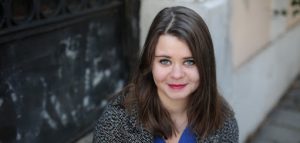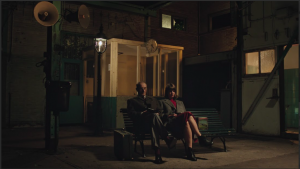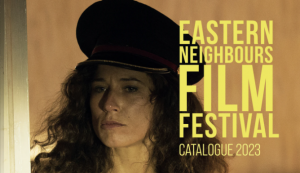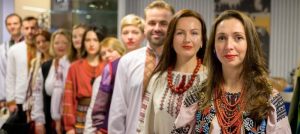
From Amazonian Forests to Hymalaian Peeks in a Quest for the Meaning of Love
Interview by Tatjana Lisjak
Andjela and Davor Rostuhar are a married couple who filmed the well-known, visually stunning documentary Love Around the World, which is also the opening film of the Eastern Neighbors Film Festival. On the eve of the festival, they revealed to us what drove them to search for the meaning of love, as well as the details of a fascinating journey across six continents. Part of their adventure was translated into this film, which can easily serve as a mini sociological study.
- What motivated you to embark on global research into the meaning and significance of love?
DAVOR: Andjela and I met in Zagreb, eight years ago, when she started working in our Club for Expeditions and Culture as my assistant. As soon as we met, we discovered that we shared the same passion for life and travel, and very quickly we fell in love and started a relationship. In the first two years of our relationship, she helped me to prepare and carry out the first Croatian expedition to the South Pole. She accompanied me to the coast of Antarctica where I proposed to her. As soon as she, luckily, agreed, we started planning our wedding and honeymoon. Since we are both avid travelers, we focused more on planning our honeymoon journey than our wedding. (laughs) I proposed the idea of Love Around the World, a project that I wanted to do for years, but waited for the right person to do it with. We are both very curious and like to explore the world around us and the depths within us, so she liked the idea. Our goal was to visit diverse cultures on all continents, create cross-cultural research of love and humanity, document the types of relationships people live in, and try to understand more deeply what love is and how it manifests around the world.
- In which communities have you felt the most and in which the least love? Can you describe these extremes?
ANDJELA: I think there is no such thing as big or small love. Only the interpretation of love and the way we talk about our emotions can vary from place to place. We visited cultures where there is no word for love in their language (Mosuo in China, Matis in Brasil), but the way they explained how they felt about each other does not differ from any other couple in any other culture. According to anthropologist Helen Fisher whom we interviewed in New York, people in all cultures have the capacity and brain system for love, the only difference is whether we live in a culture that will glorify love or in one where no one talks about it. People in western cultures can talk for hours about love and feelings but this does not mean that others, who cannot, love their partners less. That is why this visual, cinematic moment is very important for this project – there is so much in nonverbal communication and the way couples behave when they answer a certain question.
- Can you remember what inspired you the most, and what completely shocked you?
DAVOR: It is difficult to single out something. Anthropologically, the most important interviews were with some of the last hunters and gatherers in the world: members of the Matis tribe in the Amazon and the Bushmen of the Kalahari. The most difficult was to find the Gerewol festival in Chad, an annual gathering of the members of the Wodaabe tribe, where men wear make-up and dance to seduce women. In the Himalayas, we managed to find one of the last examples of polyandry – a traditional practice in which women have several husbands, a custom that was very rare before, and today it has almost completely died out. In China, we found one tiny culture that is the closest to the matriarchy of any culture ever recorded. Personally, I was most moved and inspired by stories about forbidden love, for example, the story of a man from the highest caste of Brahmins who married a woman from the lowest caste of “untouchables”, which even today in the 21st century in India with a billion inhabitants is a completely isolated case. Also, the man in Zambia married an albino woman, in a society where albinos are considered cursed and killed for black magic. We did a lot of research and prepared well, so nothing actually shocked us. Maybe the most surprising was the number of people who are in romantic relationships with dolls. We also interviewed some of them.
- In the West, it is expected that marriage is based on and comes from love. Is it the same in other parts of the world?
ANDJELA: Many people are surprised when they learn from our book that today, more than half of the marriages in the world are arranged. Of the 120 couples we interviewed around the world, about 20 were in arranged marriages. Especially in India, where more than 90% of marriages are arranged. Even progressive, liberal and modern people, who in their youth had relationships with partners of their own choosing, eventually, when the time comes for marriage, settle for the person chosen by their parents or relatives. Their arguments for why they do this are very logical and rational and it is difficult to refute them. For example, they will argue that our ‘love marriages’ are based on emotions, which are in their opinion very fragile. Whereas arranged marriages are based on common values, something that in the future of the marriage becomes more important than emotions. One of the arguments is also when we choose to be with someone, then we can choose to leave them, whereas if we simply accept who they have assigned to us, even without knowing them at all, then it lasts (the same as with parents, or siblings). The fact is that divorce rates are lower in countries where arranged marriages are common, but that can also be due to a lower level of human and women’s rights and the fact that divorcing in some countries is near to impossible. However, it is an interesting topic and I think the most important thing is to understand that we are all different, that each of us has our own value system that we follow, but that does not mean that someone else’s is wrong.
- Has your view and understanding of love changed after this project, and how?
DAVOR: This project has taught us a lot. If I have to single out something, here it is. Very simple. In our language, there are concrete and abstract terms. No one argues much about concrete concepts, such as table, pencil, or broccoli. We all agree on that. Love belongs to abstract concepts. As well as nationality, god, justice, etc. These concepts do not have their own objective reality, they do not exist by themselves. They exist only when we give them some meaning. And each of us gives them a different meaning. And that’s why we often disagree about it. All the quarrels in news articles, all the quarrels in the family, between foreigners, all the wars between nations, all of this because of disagreements over abstract concepts. Through this project, we tried to show how many different views there are on love and that there is no reason to condemn any of them. Emotions we feel are the same everywhere, from the Amazon to the Himalayas, from the deserts of Africa to the skyscrapers of New York, but love is an abstract concept that everyone looks at from their own angle and on which everyone has their own unique view. These views of ours are shaped by many factors – nature, culture, society, upbringing, our experience, our personal victories and defeats, happiness and suffering, so every person has its own, unique way of defining it. And hearing hundreds of them enriched our lives.









